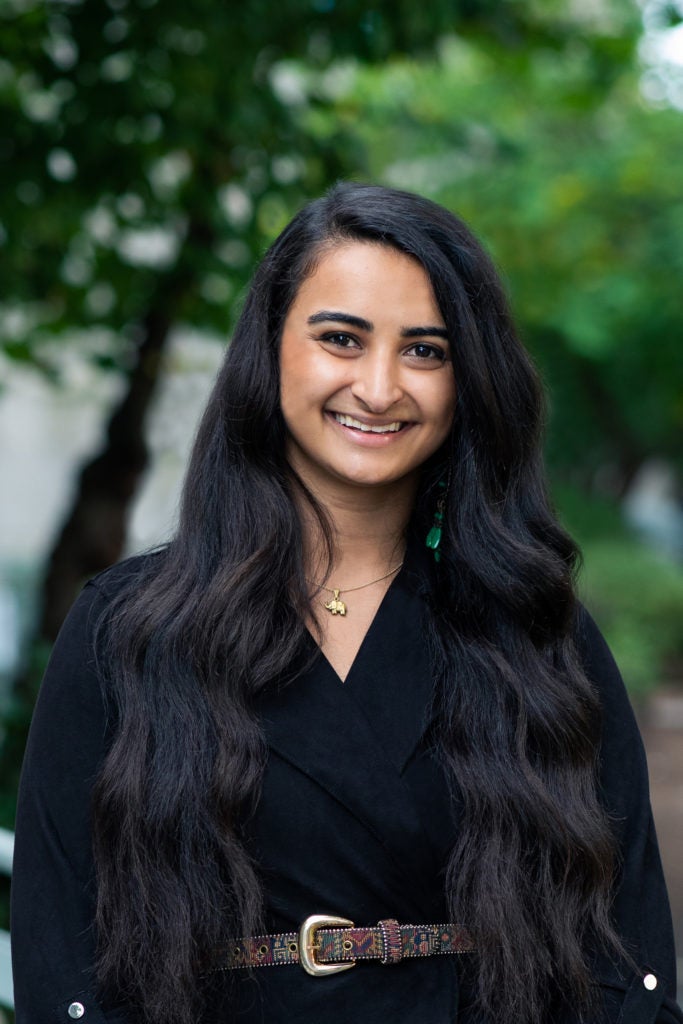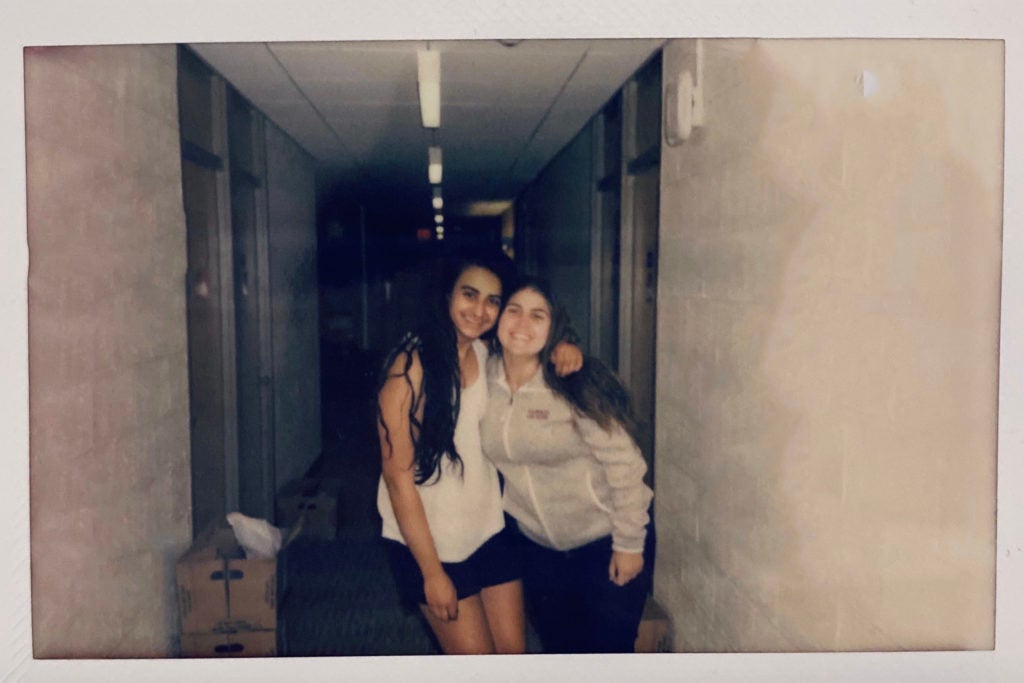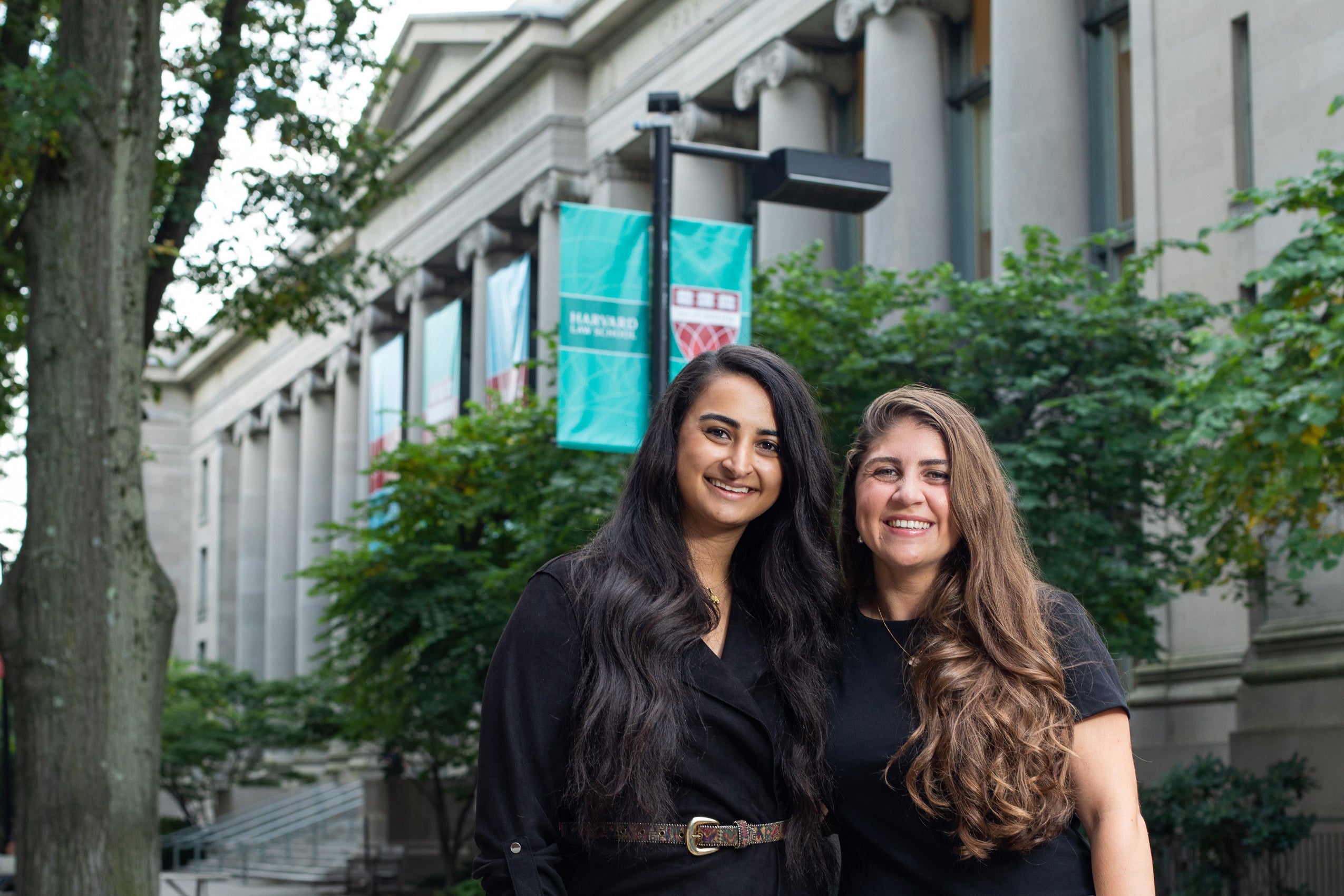It was against the din of barroom conversation and clinking glasses at Grendel’s Den that new first-year Harvard Law School students Anoush Baghdassarian ’22 and Sondra Anton ’22 first realized how remarkably similar their lives had been up to that moment.
They had both been raised in families scarred by mass atrocity. Both had studied in Latin America. Each had extensive experience advocating for those suffering from human rights abuses around the world. And most importantly, both came to law school knowing exactly what they wanted to do with their lives: to uncover, acknowledge, and address international human rights crimes.
The pair’s serendipitous meeting that day formed the basis of a friendship that has bloomed over the course of their time at law school as they became members, then co-presidents, of Harvard Law School Advocates for Human Rights — complementing one another’s strengths and continually pushing each other to pursue the important work they had come to Harvard Law to do.
‘History repeats itself’

Anoush Baghdassarian ’22
Baghdassarian grew up in Long Island, New York, the daughter of Armenian parents whose families had survived and fled to Egypt, Greece, Uruguay, and Argentina after the genocide of more than one million Armenian Christians during the Ottoman Empire in the early part of the 20th century.
In middle and high school, Baghdassarian began raising awareness among her peers of the Armenian genocide, which the Turkish government does not recognize, by giving yearly lessons to her classmates. “There’s a quote that is attributed to Hitler where he says something along the lines of, ‘who, after all, today remembers the annihilation of the Armenians,’ as a justification for going forward with the Holocaust,” says Baghdassarian. “That was really striking to me — it was an explicit example of how history repeats itself. I thought that one way history might not repeat is if we all know about the past.”
When, as a junior in high school, she was barred from further presentations on the subject after another student complained she was spreading lies and that the genocide had never happened, she refused to be silenced. Instead, she wrote an original play called “FOUND” about the genocide and put it on for the community at her local library — a powerful experience she says pushed her to think more broadly about mass atrocities.
At the same time, 500 miles away in Chapel Hill, North Carolina, Anton was also coming to understand her place in the human rights field. Like Baghdassarian, Anton’s family history was indelibly shaped by persecution and conflict: her maternal ancestors fled Jewish pogroms in Eastern Europe immediately prior to the Holocaust, and her father’s family, who are Sri Lankan Tamils, escaped the country amidst ethnic persecution and violent civil war. “I come from a family of survivors,” says Anton.
It wasn’t until her first year in high school, however, that she began to fully engage with the transgenerational impact of human rights abuse. In May 2009, the nearly three-decades-long Sri Lankan civil war came to a gruesome finale. “Tens of thousands of Tamil civilians were killed while the world watched,” says Anton. “As a second-generation Tamil, I struggled to make sense not only of the horror of the violence, but also with the disbelief that nobody seemed to care. As a member of the Jewish community who had been promised that ‘never again’ would the world stand by and allow such atrocities to happen, that was even tougher to process.”
“I come from a family of survivors”
Sondra Anton ’22
Anton began thinking more about the role devastating events like these have played throughout history and how she could make sense of her own family background through the study of human rights and international justice. “I realized that to come from two very distinct cultures that have suffered from such wide-scale human rights violations isn’t just an unfortunate coincidence. It’s about history repeating itself when we do not actively learn from the past and work to ensure other communities will never suffer from the same violations,” she says.
As Anton became increasingly convinced that she wanted to pursue a career in international human rights, her family cautioned her to be sure she was not doing so out of a sense of obligation. “My parents said, ‘you will always be Jewish, and you will always be Tamil, so a legacy of human rights will always be a part of who you are — but it does not need to define what you do as a profession.’ They really encouraged me to make sure that this was a field that I was passionate about beyond my own cultural background,” she says.
Parallel tracks

Sondra Anton ‘22
To explore that passion, Anton took a course on U.S. involvement in the military dictatorships of Latin America during her first year as a William H. Danforth Scholar at Washington University at St. Louis. She was fascinated — and horrified — by how much of what happened was virtually unknown to most Americans. “There were so many atrocities that I’d never learned about growing up, in much the same way that had I not been Sri Lankan Tamil I would never have learned about what happened there either,” she says.
Later, Anton studied in Santiago, Chile for nearly a year, working part-time at the Museum of Memory and Human Rights. While there, she received independent funding to conduct research into how communities fight for accountability in national and international courts, interviewing Chilean and Argentine torture survivors, human rights activists, and judges who had been part of the prosecution efforts against the former Chilean dictator Augusto Pinochet. Seeking to understand how societies had come to terms with the brutality of the military dictatorships of the 1970s and 80s, Anton came to understand accountability mechanisms as an integral part of restoring justice in post-conflict societies.
After graduation, Anton headed to the University of Oxford for a master’s in politics and comparative government, where she focused on examining the politics of global justice through the work of the International Criminal Court. During her time in the U.K., she joined the Bonavero Institute of Human Rights as a research affiliate and was awarded a grant to complete fieldwork in Colombia, using these opportunities to analyze how law is applied to address past atrocities. According to Anton, writing her graduate thesis on the problems facing the field of international accountability solidified her commitment to law school. “Despite all the obstacles that the human rights field faces and will continue to face, there is a need more than ever to tackle these issues head on in practice by implementing the lessons and experiences that we’ve seen throughout different places and points in history. While the law alone cannot address the monumental impact of mass atrocity, it can be a meaningful tool for communities seeking redress.”
If we can understand why ordinary people repeatedly participate in genocide, maybe we can get closer to understanding how to prevent it.
Anoush Baghdassarian ’22
Baghdassarian’s route to the law is strikingly similar. As an undergraduate at Claremont McKenna College, she studied psychology and genocide studies, focusing on the psychology of perpetrators of mass atrocity, thinking that, “if we can understand why ordinary people repeatedly participate in genocide, maybe we can get closer to understanding how to prevent it.” Outside of her classes, she again put on a production of her play about the Armenian genocide, and helped women who had been victims of human trafficking produce a dramatization of their own experiences. She joined the school’s Mgrublian Center for Human Rights, and began learning about and advocating for victims of human rights abuses around the world through Human Rights Watch and other organizations.
Immediately after graduation, she pursued two human rights fellowships. The first, Humanity in Action, took place in Berlin and introduced her to a network of young people chosen for their potential to become leaders on issues related to human and minority rights around the world. A month later she began her fellowship with the Davis Projects for Peace, which seeded an archival project she had been dreaming up, called Rerooted. For the project, which Baghdassarian continues to lead, she and her co-founder traveled to Armenia to collect and preserve the stories of Syrians displaced by the recent civil war in that country. Because many of those who left Syria were descendants of Armenians who had settled there after the 1915 genocide, Baghdassarian says her goal was to share the stories of a people who have faced “100 years of displacement.” She says it was important to her that this community was included in justice efforts for Syria, and that transitional justice in Syria was informed by affected voices from the ground, not just multilateral institutions and external actors. In pursuit of this goal, Baghdassarian has personally conducted more than 200 interviews with Syrian-Armenians, supervised summer interns from Harvard Law School, written reports to the U.N., and has secured partnerships with legal NGOs around the world working on accountability for Syria, including with the primary investigative and documentation-preserving body for Syria, the United Nations’ International, Impartial, and Independent Mechanism on Syria.
“I’ve thought a lot about why recognition matters, why people care so much if somebody acknowledges what was done to them and why,” she says. “It’s because it denies you your humanity, it denies your dignity. The work that I’m doing is so that no other community has to go a century without justice.”
After her fellowships, Baghdassarian served as an adviser to Armenia’s Permanent Mission to the United Nations, attending the body’s Third and Sixth Committee meetings on human rights, and law, respectively. She then continued her work as a master’s student in Human Rights Studies at Columbia University the following year, during which she traveled to Armenia for her thesis to conduct surveys with Syrian-Armenians regarding what justice would look like for them in a post-conflict Syria. Like Anton, she increasingly thought about the law, and its ability — albeit an imperfect one — to facilitate justice, and to promote accountability for human rights crimes.

(L to R) Anton and Baghdassarian in Gropius Hall during the spring semester of their 1L year.
Advocating for justice
After that first meeting for Section 5 students at Grendel’s in 2019 the day before classes started, Anton and Baghdassarian became fast friends and allies. “It was so great to meet somebody who was also so passionate about something — who came to law school for a specific reason,” says Baghdassarian. “It was really comforting and reassuring when many of our friends were going to law firms or when we were faced with a world of new possibilities in tangentially related fields, to be able to have one other to bounce ideas off of and stay grounded in our interests.”
One of the first things both did was to join Harvard Law School Advocates for Human Rights, a student practice organization dedicated to human rights work and advocacy on campus and around the world. Working with Advocates and under the supervision of practicing attorneys, they found a supportive and collaborative environment and many different ways to get involved in human rights work.
That first year, Anton collaborated with a judge at the International Criminal Court, looking at how the court could expand its jurisdiction, while Baghdassarian researched whether airstrikes in Yemen violated international law. They enjoyed the experience so much that they joined the board as its only first-year students their second semester, and joked that they should become co-presidents of the organization during their 3L year.
During their second year at Harvard Law, as learning and working went remote due to the pandemic, Baghdassarian and Anton remained in close contact, despite being back in their home states. “We’d call each other and keep each other going on our projects,” says Anton. “A lot of people are used to just hearing ‘no,’ or ‘that’s not feasible,’ but we just kept pushing each other to keep going, to keep making a difference.” That tenacity paid off: both Anton and Baghdassarian were named the school’s Human Rights Program Summer Fellows in 2020.
Then, in the spring of 2021, the two fulfilled their first-year dream when they were elected co-presidents of Advocates. They say their complementary skill sets — Baghdassarian enjoys research and writing, while Anton prefers direct forms of activism — have helped to expand the depth and breadth of the organization’s scope this year.
Anton recently built an Advocates student activism wing, dedicated to protest and other forms of direct action for change, from the ground up. “In addition to the work that we started last year supporting Uyghur human rights lawyer Rayhan Asat LL.M. ’16 on advocating for her brother’s release from a Chinese internment camp, we also now have a full team of students focusing on ensuring that grass-roots activism and a demonstrable commitment to social justice play a central role in how we perceive what it means to truly be an advocate for human rights,” she said.
The 80 members of Advocates this year also continue to work on important human rights projects. Baghdassarian and Anton have ensured that initiatives span the globe, including one on arbitrary imprisonment in Russia, and a collaboration with an environmental justice group in South Africa looking to document the impact of coal mining and air pollution on children.
Anton adds that Advocates are not limited to existing projects: “We hope to encourage and empower any member with an interest in something to go ahead and start it,” she says, adding that she and Baghdassarian are invested in fostering opportunities for first- and second-year J.D. students, just like a previous generation of Advocates did for them.
Baghdassarian herself established a project last September focused on the war that had broken out between Azerbaijan and Armenia in the disputed territory of Nagorno-Karabakh. Her project group eventually produced a report to be sent to the State Department in support of Magnitsky Act sanctions. The project team is continuing this year, this time drafting reports to United Nations special rapporteurs on human rights abuses such as prisoners of war, destruction of cultural heritage, and racial discrimination. At the same time, Anton created a project in the International Human Rights Clinic on accountability litigation and strategic advocacy for Sri Lanka. Her project, which is also continuing into this year, included drafting and coordinating a joint open letter with 22 prominent international NGOs calling for the U.N. Human Rights Council to adopt a resolution for justice and accountability mechanisms to address past crimes against humanity and war crimes committed there.
Baghdassarian and Anton say that their collaboration and friendship have been an enriching and important piece of their law school journey, as have the opportunities granted to them by the faculty, the Harvard Human Rights Clinic, Advocates, and the HLS community overall. As they look toward the future, they say they’re excited to see all that Advocates will achieve this year in the fight for justice for victims of mass atrocity. As for their own careers, both are deciding where they will go after graduation next summer, but each says it will involve international human rights. Maybe one day they could start a human rights litigation boutique together, Baghdassarian says, or maybe they will simply serve as one another’s sounding board and confidant in a field that can sometimes be demoralizing. In any case, they say they expect they will always be friends, ready to push one another to do the work they have always wanted to do: fight for recognition and redress for victims of atrocities across the world.
“I have a feeling we are going to be seeing a lot of each other,” says Anton.
